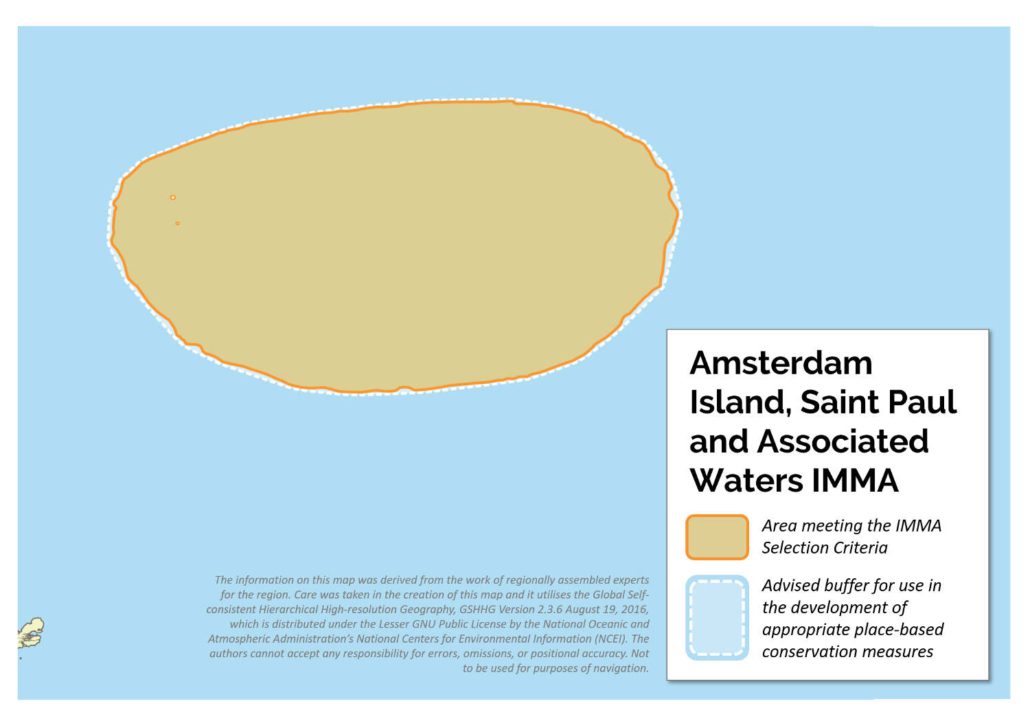Size in Square Kilometres
1,431,225
Qualifying Species and Criteria
Subantarctic fur seals – Arctocephalus tropicalis
Criterion C (1, 2)
Criterion D (2) – Marine Mammal Diversity
Other Marine Mammal Species Documented
Balaenoptera acutorostrata, Balaenoptera musculus intermedia, Balaenoptera physalus, Megaptera novaeangliae
Summary
The Amsterdam and St Paul Islands are two small volcanic islands in French territorial waters of the subantarctic Southern Indian Ocean. The islands contain a landmass of less than 66km2 between them. However, they host 11% of the world’s breeding population of subantarctic fur seals (Arctocephalus tropicalis). Hunting during the 19th century almost extirpated the population, and fewer than 100 individuals were counted in 1956. However, by 1982, the population was estimated at 30,5000, and may now only be limited by available prey in the area. In addition to subantarctic fur seals, opportunistic sightings of other marine mammals around the islands, include killer whales (Orcinus orca) that are present year-round, and southern elephant seals (Mirounga leonina) that are regular visitors but do not appear to breed in the area. Additionally, sperm whales (Physeter macrocephalus) and pygmy blue whales (Balaenoptera musculus brevicauda) have been documented in the region, which is a likely feeding area for either pygmy or Antarctic blue whales.
Description of Qualifying Criteria
Criterion A – Species or Population Vulnerability
Criterion B – Distribution and Abundance
Sub-criterion B1 – Small and Resident Populations
Sub-criterion B2 – Aggregations
Criterion C: Key Life Cycle Activities
Sub-criterion C1 – Reproductive Areas
The population of subantarctic fur seals (Arctocephalus tropicalis) on Amsterdam Island is especially interesting in the sense that it was almost completely depleted during the whaling era with less than 100 individuals being left in 1956 (Paulian 1964). This population increased to 30 500 adults by 1982 (Roux 1978). A good marker of the health of the population can be found in the annual pup production that was 6334 pups in 1982, 6414 pups in 1993 (Guinet et al. 1994) and the latest count in 2018 gives a figure of 4748 Subantarctic fur seal pups. The population increased throughout the 1990’s and is now thought to be stable or decreasing slightly. It has been suggested that this population has reached its carrying capacity and is now impacted by density-dependent effects (Chambellant et al. 2003). Pups are counted annually by the scientists of the Polar Program 109 (CNRS CEBC UMR7372, France), logistically supported by the French Polar Institute (IPEV) and the Natural Reserve.
Sub-criterion C2: Feeding Areas
Subantarctic fur seals adjust their foraging behaviour according to both seasonal and annual changes in oceanographic conditions, and thus probably, food availability (Georges et al. 1997, Beauplet et al. 2004). The fur seals exploit the Subtropical Front, but also exhibit large differences in their seasonal distributions, ranging from short trips in restricted foraging areas during summer to widely distributed foraging grounds during the winter, possibly reflecting a decrease in food availability close to the islands. The proposed cIMMA thus encompasses the largest foraging range measured (Fig. S1, Beauplet et al. 2004), so as to ensure that food resources would not be a limitation to this population. Acoustic studies suggest that the pygmy blue whales, one of the subspecies of blue whales in the Southern Ocean, also use the proposed cIMMA as a foraging area (Samaran et al., 2010).
Sub-criterion C3: Migration Routes
C3a – Whale Seasonal Migratory Route
C3b – Migration / Movement Area
Criterion D – Special Attributes
Sub-criterion D1 – Distinctiveness
Sub-criterion D2 – Diversity
Supporting Information
Beauplet, G., Dubrocal, L., Guinet, C., Cherel, Y., Dabin, W., Gagne, C., Hindell, M. 2004. Foraging ecology of subantarctic fur seals Arctocephalus tropicalis breeding on Amsterdam Island: seasonal changes in relation to maternal characteristics and pup growth. Marine Ecology Progress Series. 2004, 273, 211-225
Branch, T.A., Stafford, K.M., Palacios, D.M., Allison, C., Bannister, J.L., Burton, C.L.K., Cabrera, E., Carlson, C.A., Galletti Vernazzani, B., Gill, P.C. and Hucke-Gaete, R. Past and present distribution, densities and movements of blue whales Balaenoptera musculus in the Southern Hemisphere and northern Indian Ocean. Mammal Review, 2007, 37(2), pp.116-175
Chambellant M., Beauplet G., Guinet C., Georges J.Y. 2003. Long-term evaluation of pup growth and preweaning survival rates in subantarctic fur seals, Arctocephalus tropicalis, on Amsterdam Island. Canadian Journal of Zoology. 2003, 81, 1229-1239
Georges J.Y., Bonadonna F., Guinet C. 2000. Foraging habitat and diving activity of lactating Subantarctic fur seals in relation to sea-surface temperatures on Amsterdam Island. Marine Ecology Progress Series. 2000, 196, 291-304
Guinet C., Jouventin P., Georges J.Y. 1994. Long term population changes of fur seals Arctocephalus gazella and A. tropicalis on subantarctic (Crozet) and subtropical (Saint Paul and Amsterdam) islands and their possible relationship to El Niño Southern Oscillation. Antarctic Science. 1994, 6, 473-478
Paulian, P. 1964. Contribution a l’etude de l’otarie de l’Ile d’Amsterdam. Mammalia 1964, 28, 1-146.
Roux, J.P. 1987. Subantarctic fur seal, Arctocephalus tropicalis, in French Subantarctic territories. In Status, Biology, and Ecology of Fur Seals. Croxall, J. P. and R. L. Gentry (Eds). NOAA tech. Rep. NMFS 51: 79–81 (Proceedings of an International Symposium and Workshop, Cambridge, England, April 1984)
Samaran, F., Adam, O., Guinet, C. 2010. Discovery of a mid-latitude sympatric area for two Southern Hemisphere blue whale subspecies. ESR 12:157-165 (2010) DOI: https://doi.org/10.3354/esr00302
Tixier P., Guinet C. 2013. Catalogue de Photo-Identification 2013: Orques des îles Amsterdam et St Paul. Réserve Naturelle des Terres Australes Terres Australes et Antarctiques Françaises & Centre d’Etudes Biologiques de Chizé – CNRS.
Downloads
Download the full account of the Amsterdam Island, Saint Paul and Associated Waters IMMA using the Brochure button below:
To make a request to download the GIS Layer (shapefile and/or geojson) for the Amsterdam Island, Saint Paul and Associated Waters IMMA please complete the following Contact Form:



